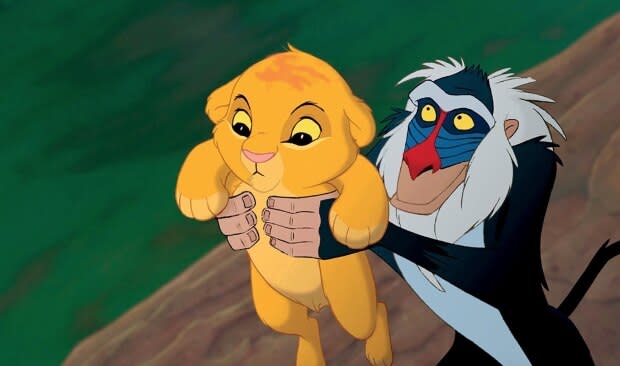Disney accused of appropriation for trademarking Swahili words 'Hakuna Matata'
Disney's trademarking of the Swahili phrase "Hakuna Matata," used in its smash hit The Lion King, has prompted a petition referring to the legal move as appropriation.
The term, which means "no worries" or "no trouble," is commonly used throughout East Africa where Swahili is spoken, including in countries such as Kenya, Tanzania, Mozambique and Burundi.
Disney first applied for the trademark in 1994, which is the same year its animated film — which used the now-ubiquitous catchphrase — hit theatres. The movie's widespread popularity is how most North Americans became familiar with the foreign words.
A live-action version directed by The Jungle Book's Jon Favreau set to be released in July of 2019 has prompted new debate over whether language can be owned by an entity that didn't create it and whose proprietors don't speak it.
Tens of thousands of signatures
"The decision to trademark 'Hakuna Matata' is predicated purely on greed and is an insult not only [to] the spirit of the Swahili people but also, Africa as a whole," the petition, started by Toronto-based, Zimbabwean-born Shelton Mpala, reads.
"Disney can't be allowed to trademark something that it didn't invent," the petition says.
"The movie is set in Africa and the characters have African names, which further makes the decision to implement the trademark a perplexing one."
The Lion King follows the life of Simba (a Swahili word meaning lion), who flees his home after being led to believe his actions led to the death of his father. Along his journey, he encounters a warthog and meerkat who employ the Swahili phrase "Hakuna Matata" and turn into a catchy song.
Watch: Hakuna Matata performed in the 1994 animated film, The Lion King
Disney said in a statement: "Disney's registration for 'Hakuna Matata' T-shirts, which was filed in 1994, has never and will not prevent individuals from using the phrase."
The petition, which calls on Disney to remove the trademark, has acquired more than 150,000 signatures so far this week.
And it's not the only challenge to the registration. An article in Kenya's Business Daily last month called on the country to protect its own heritage where possible so it can't be "pilfered" by others.
"It is unfortunate that there has been a lot of pilferage of African culture over the years, through the use of intellectual property rights," wrote Kenyan lawyer Cathy Mputhia. "This means that heritage that ought to belong to a certain group of people is instead pilfered using legal methods, whereby third parties end up being awarded sole rights."
Discussion among East Africans on social media also pointed to a Kenyan band called Them Mushrooms which featured "Hakuna Matata" in its popular 1982 hit Jambo Bwana, more than a decade before Disney used it.
While the trademark is well over a decade old, the current backlash speaks to a shift in cultural climate.
"Kenyans and East Africans as a whole are waking up to the idea that it's not cool anymore for a foreign company to make profits off something they did not take part in creating, something that is inherently and culturally African," said Kenyan-born, Boston, Mass.-based lawyer Allan Tuli.
Disney registered the trademark for the purpose of using the slogan on clothing, according to the U.S. Patent and Trademark Office. Other companies have also trademarked the phrase for different purposes, including toys, baby products, pet products and vitamin supplements.
Intellectual property lawyer Joseph A. Mandour says the trademark doesn't apply to language or culture. It's a business decision that allows a company to brand a specific product.
It's not like, now they own that phrase and no one else can use it ... It doesn't mean that Disney owns the words any more than Apple owns the word apple. - Joseph A. Mandour, intellectual property lawyer
"I think it's more of a misunderstanding of what Disney owns by virtue of trademarking those words," said Mandour, a managing partner at the San Diego-based law firm Mandour & Associates. "If they're going to be selling shirts, they need to make sure they protect their trademark rights."
He says registering with the U.S. Patent and Trademark Office protects the business against knock-offs and applies to goods sold in the U.S.
"It's not like, now they own that phrase and no one else can use it ... It doesn't mean that Disney owns the words any more than Apple owns the word apple."
However, he also added: "Anytime you're a major company, you have to try to think about how the public is going to perceive your actions."
Disney forced to back down before
While Disney has been lauded for recent progressive steps in its cultural portrayals — its upcoming series Mira, Royal Detective has a South Asian heroine and cast and its latest version of Aladdin will star Canadian-Egyptian Mena Massoud — it's also faced criticism over appropriation before.

Pressure to back down proved successful after Disney tried to trademark the term "Dia de los Muertos", or Day of the Dead. It's a traditional holiday celebrated in Mexico and in parts of Latin America to honour the lives of loved ones who have passed away.
Disney wanted to register the term for use on merchandise, done in advance of what would become its Oscar-winning film Coco, which centred around the observance. But the company withdrew its application in 2013 after social media backlash from the Latino community and an online petition similar to the one Mpala has started.
Mpala said in his petition that he respects Disney's entertainment value but questions how a company "re-releasing a movie (The Lion King) that celebrates the unlikely friendships, acceptance, and unity" would also make a decision that "goes completely against these values."

